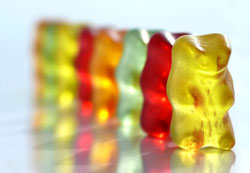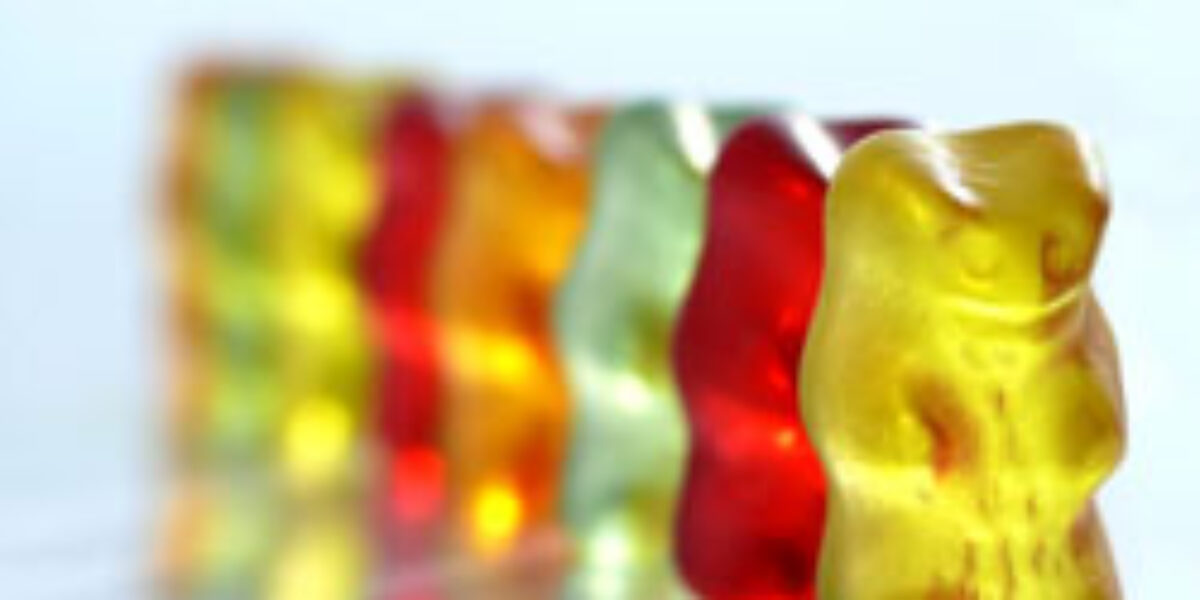Haribo: The Bear Essentials for Sweet Success
 It started at a small kitchen sink in a small suburb in Bonn with a sack full of sugar and a copper kettle. It has developed into one of the best-loved and most well-known brands in the confectionery industry. This is the story of German company Haribo, a global giant that employs over 6,000 staff worldwide, 550 of them in the U.K. If all the Haribo gummy bears produced in a year were laid down head to toe, they would go around the earth four times. The Haribo story is one of product innovation, effective advertising, bold acquisition and fierce brand protection.
It started at a small kitchen sink in a small suburb in Bonn with a sack full of sugar and a copper kettle. It has developed into one of the best-loved and most well-known brands in the confectionery industry. This is the story of German company Haribo, a global giant that employs over 6,000 staff worldwide, 550 of them in the U.K. If all the Haribo gummy bears produced in a year were laid down head to toe, they would go around the earth four times. The Haribo story is one of product innovation, effective advertising, bold acquisition and fierce brand protection.
A little history. In December 1920, Hans Riegel registered the name Haribo, an abbreviation of HAns RIegel BOnn, in the Bonn Commercial Registry. This portmanteau technique seems to have been a popular way to name brands in Germany. Adi Dassler went down the same route with Adidas. In 1922, Riegel laid the foundations of Haribo’s future success by creating the Dancing Bear – a little bear made out of fruit gum. The cutesy design was inspired by the trained bears that were a fixed part of the festivities at annual markets and other celebrations well into the 19th century in Germany.
From 1939 to 1945, Germany prioritised the task of making tanks and munitions, and Haribo experienced setbacks, mainly due to the shortage of raw materials. Nonetheless, just five years after the end of the war, Haribo employed around 1,000 members of staff. The continued success and growth of the company, now run by Hans’s sons Hans Jr. and Paul, was based on the uniformly high quality standards of its products, the constant development of new product ideas and the marketing strategy developed by the Riegels for the product range.
Riegel recognized very early on how important the new medium of television would be for the further development of the firm. In 1962, the first Haribo commercials were broadcast on German television. Some 98% of all German consumers are now familiar with the slogan “Kids and grown-ups love it so, the happy world of Haribo”, which was developed in the 1940s and expanded in the 1960s. In 1991, Haribo established a successful and long-lasting advertising partnership with famous entertainer Thomas Gottschalk. The Guinness Book of World Records, having nothing better to do, has accredited Gottschalk with being the world’s longest-serving brand spokesman.
Haribo is now leader in the U.K. gums and jellies market with sales of 550 tons a week and a turnover of £80 million
The company supports its sales through self-aggrandising special promotions. There is a touring show called “Haribo – Becoming a Cult Brand with the Golden Bear”. There is a Haribo museum in France. Disney made a cartoon series called Adventures of the Gummi Bears. The sugar sweet English-language Gummy Bear Song has been viewed over 300 million times on YouTube. Bizarrely, and perhaps as an antidote to that saccharine song, Haribo is involved in the sponsorship of superbike racing. Team Haribo Starmix prides itself on being an incubator British superbike team, spotting talented young racers and nurturing them to reach their full potential.
The firm has been continuously expanding its product range beyond the ursine through the purchase of quality brands both in and outside Germany. In 1986, Haribo acquired the Maoam brand of sweets, and this has been the best-selling chewy candy brand in Germany for years. In 1972, Haribo bought into Dunhills, a traditional English company known for its Pontefract cakes. In 1994, it bought the company outright. Haribo is now leader in the U.K. gums and jellies market with sales of 550 tons a week and a turnover of £80 million. Its investment in bagged confectionery has also resulted in Starmix becoming a massive £30-million brand.
Starmix is unique to the U.K., and it is this ability to adapt to local markets that also helps to explain the success that Haribo has enjoyed around the world. The Haribo range of products is by no means identical from one country to the next. The French, for example, prefer marshmallow products such as Tagada or Chamallows and sugar-coated candies like Dragibus. In England, as mentioned, Star Mix is the number one seller. In the Scandinavian countries, there is a clear preference for Matador Mix, a mixture of fruit-flavoured gum drops and liquorice.
Haribo now operates a total of 16 production sites around the world and is still headquartered in Bonn. It remains a family business. Hans Jr. still runs the company, even to the extent of writing its television ads. Haribo has managed to defend itself against private-label competition and has expanded its market share in a declining market. It’s not shy of acting aggressively to do so. Cologne’s regional court recently banned the further sale of Lindt’s gold-foil wrapped chocolate bear after Haribo successfully argued that confused shoppers could easily mistake the bear for its own fruity sweets. Haribo was also recently fined €2.4 million by Germany’s Federal Cartel Office for improperly sharing sales information with rivals.
Despite its stable market share, Haribo has felt the impact of the declining demand for sugar confectionery, and turnover has seen continuous and significant declines since 2005. Although Haribo’s products are virtually fat free, making them a comparatively low-calorie treat, the company has been affected by the health and wellness trend because the sugar content of its products clashes with consumer’s growing concerns for dental health. In response to increasing consumer demand for less artificial ingredients in packaged food, Haribo switched from artificial colouring for its gummy bears to natural colouring derived from fruit and vegetable juices in 2007.
Whatever life throws at Haribo, however, the Bonn-based firm keeps bouncing back. Germans, being sentimental and fond of tradition, have a very soft spot for Haribo. Apparently, Wilhelm II, the Kaiser of the German Reich until 1918, loved them dearly. From his exile in Holland, he let it be known that the gummy bears from Bonn were one of the best things to come out of the Weimar Republic. Albert Einstein too it appears liked a bit of gummy bear action. Now, it seems that the rest of the world agrees with them.


